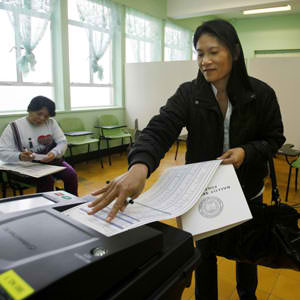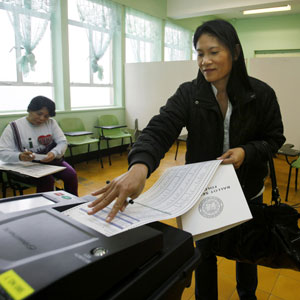THE May 10 election was characterized by a “high incidence and widespread occurrence of technical and management problems” that tainted the integrity, credibility and accuracy of the automated election system.
This was the conclusion drawn by the nongovernmental Center for People Empowerment in Governance (CenPEG) in its study of the last national and local elections which was presented on Tuesday at Club Filipino.
The report attributed the high incidence of “technical hitches, blunders, voting procedural errors and other operational failures” to “the lack of safeguards, security measures as well as timely and effective contingency measures.”
The absence of these measures “proved damaging to the accuracy, security and reliability of election returns,” it said.
The report was titled “Project 3030” in reference to what the NGO described as the 30 vulnerabilities in the automated election system and the 30 solutions it had proposed to the government. Funded by the European Union, the project involved the monitoring of election incidents from May 2 to 31 and extensive case studies conducted in nine provincial areas. The study made use of research coordinators in 12 regions and thousands of trained poll watch volunteers in at least 50 provinces.
The report pointed to “disturbing findings” that occurred nationwide, such as:
- mismatched time and date stamps on all precinct count optical scan (PCOS) machines
- transmission failures
- erroneous certificates of canvass in at least 57 provinces and cities
- ballots and compact flash (CF) cards delivered manually for canvassing
- discovery of the console port in all the machines, making the PCOS vulnerable to tampering
- erroneous entries of total number of voters and votes cast in the national canvassing center and Congress
- near anarchy in the clustered precincts
The report said that on election day, precinct count optical scan (PCOS) machines in many precincts broke down or were malfunctioning. This delayed the opening of voting, counting and the whole election process itself.
Delays in the delivery of reconfigured CF cards, which were discovered to have been defective even before election day, led to delayed final testing and sealing and of voting itself, the report added. Allegations of CF card manipulation also resulted in electoral protests.
The report also said verifying the authenticity of ballots was not fully implemented because a significant number of Boards of Election Inspectors (BEI) at the precinct level did not use UV scanners.
Citing a survey made by the Social Weather Stations, CenPEG said only half of BEIs used the ballot scanner. Some precincts did not receive any scanner at all; some of those that did had either left the scanners untouched or widely mistook them for emergency flashlights, the study said.
Precinct clustering led to long queues of voters which made the exercise of suffrage inconvenient and difficult. The Comelec had failed to put in place an effective voting system in anticipation of the long lines of voters which CenPEG had warned the poll body about.
Disputing the Comelec’s claim that the automated system yielded fast results, CenPEG said actual voting in the May 10 elections took several hours longer than in previous poll exercises. Like most voters who waited for three to nine hours in order to cast their votes, then presidential candidate Benigno “Noynoy” Aquino III had to wait in line for about five hours.
It also noted that Aquino was proclaimed president on June 9 or 30 days after election day. In contrast, Joseph Estrada was proclaimed only 19 days after the presidential election of 1998.
Although the results of the national elections appeared to have been accepted by the public and by the candidates, local elections in many places continue to be contested. At least 100 election protests from 41 provinces and cities have been filed, CenPEG said.
Convenors of the Automated Elections System (AES) Watch also accused the Comelec of violating the law and the Constitution in the implementation of poll automation.
Pablo Manalastas, a mathematician and a convenor, said the poll body’s mandate as laid down by Republic Act 9369 was to guard the secrecy and sanctity of the ballot, to make the elections fast, accurate and reflective of the people’s will, and to use the most suitable technology of demonstrated capability.
He said Comelec failed to do these. Lack of education and training in the new system made many voters vulnerable to manipulation by politicians or their leaders. A culture of “expertism” was promoted by the poll body, along with the idea of corporate profiting from the elections.
Manalastas also criticized the Comelec for harnessing a foreign company, Smartmatic, even though Filipino experts in information technology are known to be tapped by other countries because of their reputed knowledge.
In tapping the Venezuelan IT company, Manalastas said the Comelec “practically abdicated its role as election manager.” In addition, Smartmatic would now be using the Philippines in its advertising initiatives to enhance its prestige, he said.
Allan Borra, of the De La Salle University’s College of Computer Studies, said his father, former Comelec Commissioner Resurreccion Borra, said that by availing itself of the services of Smartmatic, “the Comelec virtually outsourced our sovereignty.”
Lawyer Harry Roque, of the Concerned Citizens Movement, said the Comelec, in hiring the Venezuelan firm, violated Section 2 of the constitutional provision on the Comelec which states that the poll body shall “exercise exclusive original jurisdiction over all contests relating to the elections.”
The contract with Smartmatic, however, provides that the company shall be in charge of the “technical aspects” of the elections, a role which is pivotal in automated polling.
Roque also pointed out that Smartmatic’s promise to hire 80,000 IT workers could not even be verified because there is no record that the company actually did this.
In addition, Roque said the constitutional requirement of a 60-40 partnership between Filipinos and foreigners may have been violated in the Comelec’s dealings with Smartmatic.
He noted that the joint venture agreement with the company provided for a mandatory appointment of one director from Smartmatic whose presence shall constitute a quorum in a meeting of directors. Smartmatic also got to nominate the important officers such as the chair and the corporate secretary.
CenPEG released the AES Watch study more than a week after scoring a victory at the Supreme Court which ordered the Comelec to make available the source code of the automated election system to all interested parties. The “source code” is the human-readable representation of the instructions that control the operation of a computer.
The NGO also said it was still demanding the release of 21 legal documents from the Comelec that would help it review the election process more thoroughly and gain access to substantive data on the conduct of the electoral exercise.

